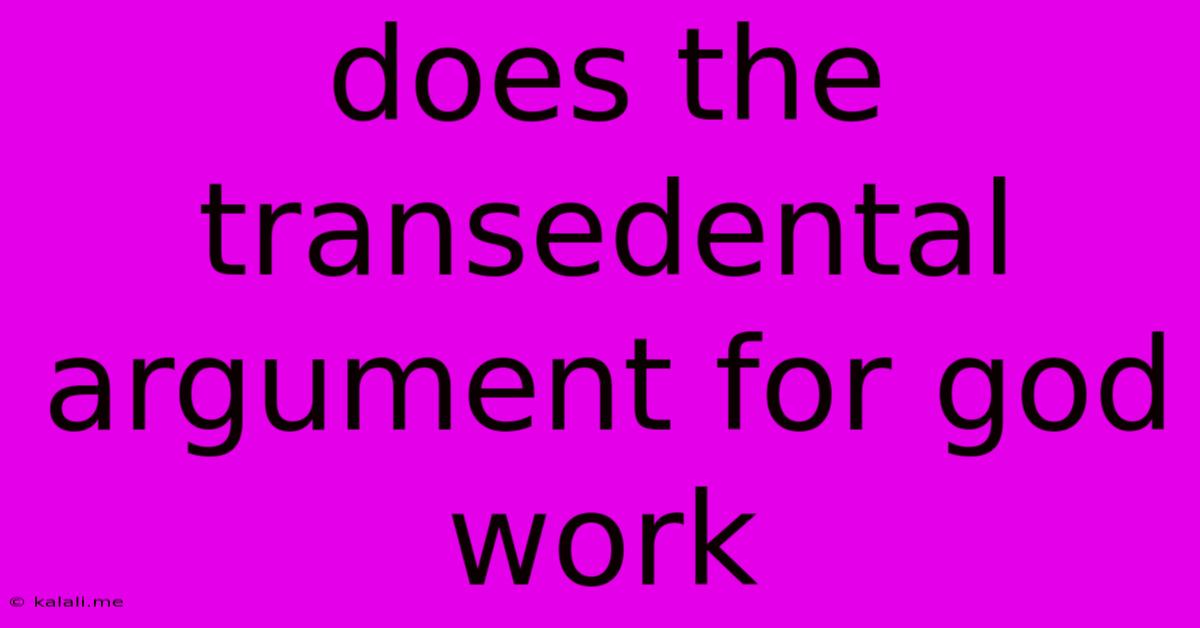Does The Transedental Argument For God Work
Kalali
Jun 07, 2025 · 3 min read

Table of Contents
Does the Transcendental Argument for God Work? A Critical Examination
The transcendental argument for God's existence, a cornerstone of philosophical theology, posits that the very concept of certain aspects of reality, such as morality, reason, or consciousness, necessitates the existence of God. This argument doesn't attempt to prove God's existence through empirical evidence but rather through logical necessity. But does it truly work? This article will critically examine the strengths and weaknesses of this influential argument.
What is the Transcendental Argument?
The transcendental argument, unlike cosmological or ontological arguments, doesn't start with the universe or God's nature. Instead, it begins with features of our experience – specifically, those features that seem inexplicable without a transcendent ground. These features often include:
- Moral objectivity: The existence of objective moral values and duties. If morality is merely subjective, then actions deemed universally wrong (like genocide) could be morally permissible depending on individual perspective. The argument suggests that the existence of objective morality points to a transcendent moral lawgiver: God.
- Rationality: Our capacity for reason and logic. If rationality is simply a biological quirk, then it lacks any inherent validity. The transcendental argument suggests that the reliability and universality of reason point to a rational, transcendent source: God.
- Consciousness: Our subjective experience of the world. The "hard problem of consciousness" – explaining how physical matter gives rise to subjective experience – remains a major challenge in philosophy. The argument suggests that consciousness may require a non-physical, transcendent explanation: God.
Strengths of the Transcendental Argument:
- Intuitive Appeal: The argument taps into our deeply held intuitions about morality, reason, and consciousness. Many find it intuitively compelling to believe that these fundamental aspects of reality point to something beyond the material world.
- Addresses Fundamental Questions: It tackles some of the most profound and enduring questions in philosophy and theology, offering a potential answer to the "why" behind our experience.
- Avoids Empirical Limitations: Unlike empirical arguments for God's existence, the transcendental argument doesn't rely on scientific evidence, which can be contested or incomplete.
Weaknesses of the Transcendental Argument:
- Contestable Premises: The argument's success hinges on the acceptance of its premises. Critics argue that objective morality, rationality, and consciousness can be explained without resorting to God. Evolutionary explanations for morality, for example, suggest that moral sentiments emerged through natural selection. Similarly, materialist theories of consciousness attempt to explain subjective experience through physical processes.
- The "God of the Gaps" Fallacy: Critics accuse the transcendental argument of committing the "God of the Gaps" fallacy – filling unexplained phenomena with divine intervention. As scientific understanding advances, the gaps shrink, potentially undermining the argument's foundation.
- Lack of Specificity: The argument, while suggesting a transcendent source, doesn't provide a detailed description of God. The characteristics of this transcendent being remain largely undefined.
- Alternative Explanations: The argument fails to adequately address alternative explanations for moral objectivity, rationality, and consciousness. These alternative explanations may not involve a personal God, but instead appeal to impersonal principles, emergent properties, or other naturalistic accounts.
Conclusion:
The transcendental argument for God's existence offers a compelling, albeit complex, framework for understanding the relationship between our experience and the possibility of God. However, its reliance on potentially fallible premises and its susceptibility to alternative explanations significantly weakens its persuasive power. While it may resonate with some on an intuitive level, it faces considerable challenges from a philosophical and scientific standpoint. Ultimately, whether or not the transcendental argument "works" remains a matter of ongoing philosophical debate and individual interpretation. Further exploration into the intricacies of morality, consciousness, and rationality is crucial for a comprehensive evaluation of this influential theological argument.
Latest Posts
Latest Posts
-
What Happens To Hal In Megaming
Jun 07, 2025
-
Gmail Signature Not Showing On Reply
Jun 07, 2025
-
What Can I Substitute For Gruyere Cheese
Jun 07, 2025
-
Analytical Database The Manager May Want To Know
Jun 07, 2025
-
Can You Put A Backpack In The Dryer
Jun 07, 2025
Related Post
Thank you for visiting our website which covers about Does The Transedental Argument For God Work . We hope the information provided has been useful to you. Feel free to contact us if you have any questions or need further assistance. See you next time and don't miss to bookmark.